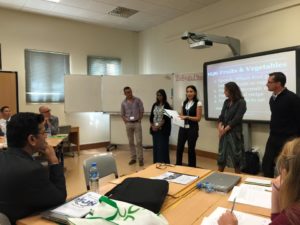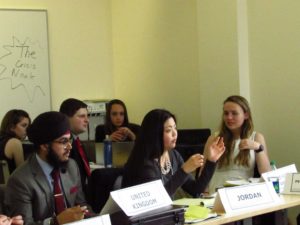Katrina Hill is teacher in Roanoke, Virginia, where she teaches language arts and social studies to students in middle school. Katrina started the school’s Model UN program as an Advisor three years ago, and had the opportunity to attend the Best Delegate Advisor Institute this past summer.
 A lot of our Model UN time is spent on preparation. In the beginning, students are learning about how to research general country information and policies, and becoming familiar with practices of the United Nations and Model UN. We spend countless hours reviewing how to organize a position paper, practicing “parli pro,” and teaching our students all of the acronyms that come with Model UN.
A lot of our Model UN time is spent on preparation. In the beginning, students are learning about how to research general country information and policies, and becoming familiar with practices of the United Nations and Model UN. We spend countless hours reviewing how to organize a position paper, practicing “parli pro,” and teaching our students all of the acronyms that come with Model UN.
Part of what I appreciate about MUN as an advisor, is that it is truly focused on the process. Contrary to how their classes may be set up, students are not working towards the end goal of a grade, but rather towards attending a conference, where they can put their skills to the test.
For my students, MUN conferences are what it’s all about. They have spent months in mock committees, learning or improving their skills in research, writing, presentation, debate, and negotiation. When the committee and country assignments come in, we meet as a group to decide who is ready for a crisis committee and who wants to work with a partner in a double delegation.
One of the most important things we do just before a conference is to set individual goals for the team. We start by taking an inventory of each delegate’s strengths and weaknesses, and then use this to guide the goals. This gives students specific things to work towards and can allow students to feel success, even if they don’t walk away with an award. I encourage students to make goals that are S.M.A.R.T— Specific, Measurable, Attainable, Realistic, and Timely.
Students attending their first conference often set goals that focus on participation. Generally, students have prepared an opening speech ahead of time, and will often set the goal of raising their placard and getting on the speaker’s list right away. Additionally, students have set goals to speak during a moderated caucus at least once during each committee session, to connect with one other delegate during an unmoderated caucus, or to be a signatory on a resolution. In novice committees, which are generally larger, students stand out by speaking and sharing their ideas. We acknowledge that they may feel nervous or are worried about making a mistake, but if they focus on the goal of speaking a set number of times, they can find success in keeping their placards raised.
As students gain experience, their goals naturally shift. In smaller committees, students have more opportunity to lead. Goals for delegates who have participated in multiple conferences may include forming blocs or authoring a resolution. A former student of mine shared that one of her goals was to talk with different people during each unmoderated caucus, as this helped her stay involved with multiple conversations that were taking place during committee sessions.

A delegate who excelled at debate found that a goal of forming blocs quickly allowed him to demonstrate his strength. Once my students had been to several conferences and developed specific techniques that worked for them. Another one of my students is a great note-taker, a skill she uses to position herself to author a resolution. And finally, one former student would often set the goal of “don’t start a war.” As an avid fan of history, he often preferred crisis committees and the freedom to go beyond general UN policy. In earlier conferences, it became somewhat of a joke that he always ended up starting a war. Though it may seem silly to an outsider, the goal of “Don’t start a war,” kept this delegate focused on fostering cooperation and dialogue.
Awards at conferences can be a great incentive for some students, but as an advisor, it’s important to make sure that all students can achieve some measure of success. Setting specific goals ahead of time allows students to reflect on their progress and always make progress.
